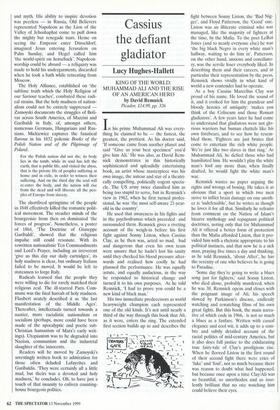Cassius the defiant gladiator
Lucy Hughes-Hallett
KING OF THE WORLD: MUHAMMAD ALI AND THE RISE OF AN AMERICAN HERO by David Remnick Picador, £14.99, pp. 326
In his prime Muhammad All was every- thing he claimed to be — the fastest, the greatest, the prettiest. As his doctor said, 'If someone came from another planet and said "Give us your best specimen" you'd give him Ali.' He was also, as David Rem- nick demonstrates in this historically sophisticated and splendidly entertaining book, an artist whose masterpiece was his own image, the auteur and star of a theatri- cally compelling, politically cogent specta- cle. The US army twice classified him as being too stupid to serve, but in Remnick's view in 1962, when he first turned profes- sional, he was 'the most self-aware 21-year- old in the country'.
He used that awareness in his fights and in the psychodramas which preceded and surrounded them. Remnick gives a riveting account of the weigh-in before his first fight against Sonny Liston, when Cassius Clay, as he then was, acted so mad, bad and dangerous that even his own team were unsure that he hadn't lost his sanity until they checked his blood pressure after- wards and realised how coolly he had planned the performance. He was equally astute, and equally audacious, in the way he responded to historical change and turned it to his own purposes. As he told Remnick, 'I had to prove you could be a new kind of black man.'
His two immediate predecessors as world heavyweight champion each represented one of the old kinds. It's not until nearly a third of the way through this book that Ali, as it were, enters the ring. The extended first section builds up to and describes the fight between Sonny Liston, the 'Bad Nig- ger', and Floyd Patterson, the 'Good' one. Liston was an illiterate criminal who was managed, like the majority of fighters at the time, by the Mafia. To the poet LeRoi Jones (and to nearly everyone else) he was 'the big black Negro in every white man's hallway, waiting to do him in'. Patterson, on the other hand, anxious and conciliato- ry, was the servile loser everybody liked. In describing them and their careers, and in particular their representation by the press, Remnick shows vividly in what kind of world a new contender had to operate.
As a boy Cassius Marcellus Clay was proud of his name. He loved the sound of it, and it evoked for him the grandeur and bloody heroics of antiquity: 'makes you think of the Coliseum and those Roman gladiators'. A few years later he had come to understand that gladiators were not glo- rious warriors but human chattels like his own forebears, and to see how he resem- bled them. 'Fighters are just brutes that come to entertain the rich white people. We're just like two slaves in that ring.' As Muhammad Ali, he defied those who had humiliated him. He wouldn't play the white man's fool any more than, when finally drafted, he would fight the white man's war.
Remnick wastes no paper arguing the rights and wrongs of boxing. He takes it as obvious that a sport in which two men strive to inflict brain damage on one anoth- er is 'indefensible', but he writes as though he loves it for all that. Similarly he refrains from comment on the Nation of Islam's bizarre mythology and repugnant political doctrines, noting only that for Muhammad Ali it offered a better form of protection than the Mafia afforded Liston, that it pro- vided him with a rhetoric appropriate to his political instincts, and that now he is a sick man, praying five times a day and thinking, as he told Remnick, 'about After', he has the serenity of one who believes he is going to Paradise.
'Some day they're going to write a blues song just for fighters,' said Sonny Liston, who died alone, probably murdered, when he was 38. Remnick opens and closes with the poignant image of Ali, his speech slowed by Parkinson's disease, endlessly watching and rewatching films of his own great fights. But this book, the main narra- tive of which ends in 1966, is not so much a blues as a fanfare. Written with casual elegance and cool wit, it adds up to a som- bre and subtly detailed account of the racial politics of mid-century America, but it also does full justice to the exhilarating true fairy-tale of Clay's prodigious rise. When he floored Liston in the first round of their second fight there were cries of 'fake' and 'foul', not so much because there was reason to doubt what had happened, but because once upon a time Clay/Ali was so beautiful, so unorthodox and so inso- lently brilliant that no one watching him could believe their eyes.


























































































 Previous page
Previous page